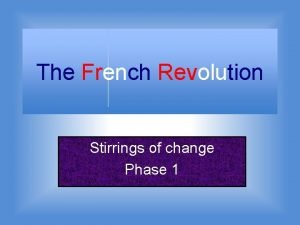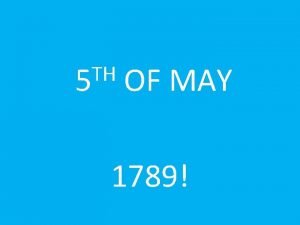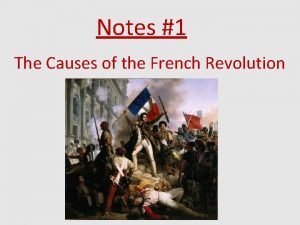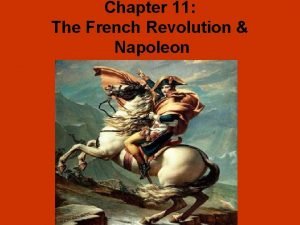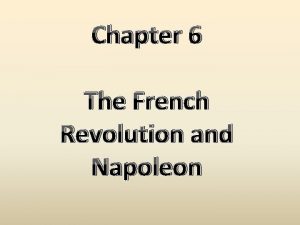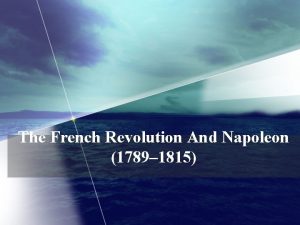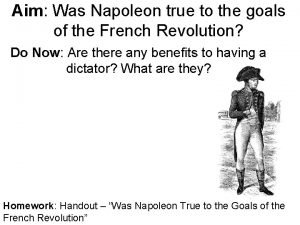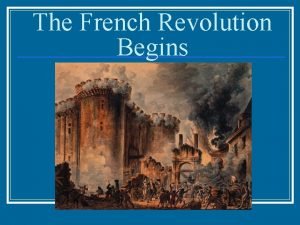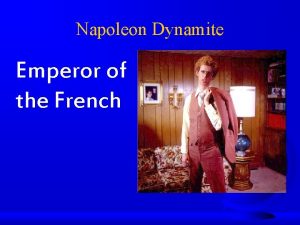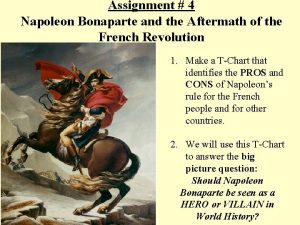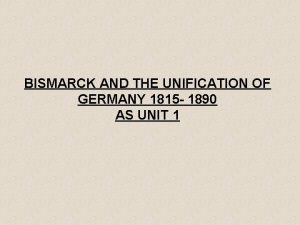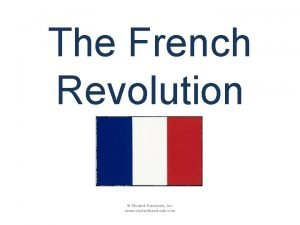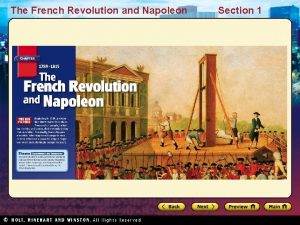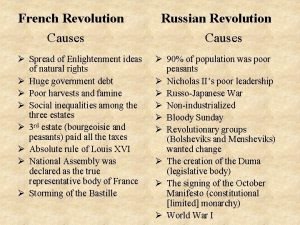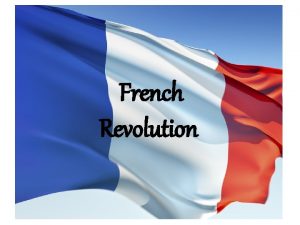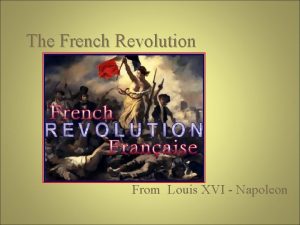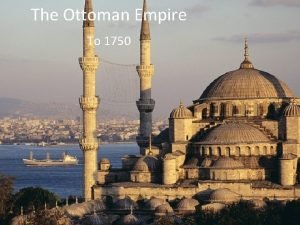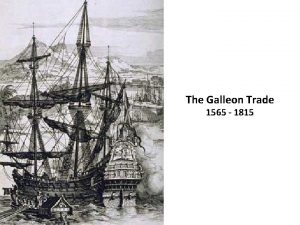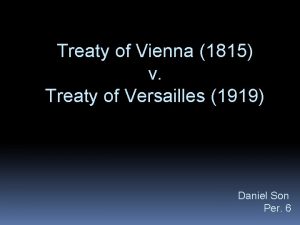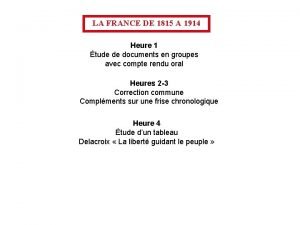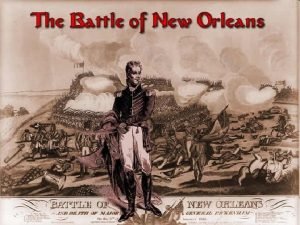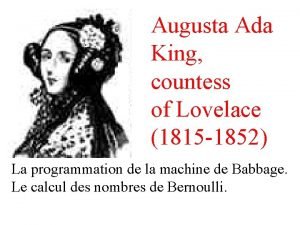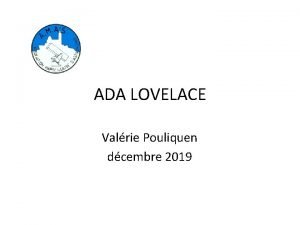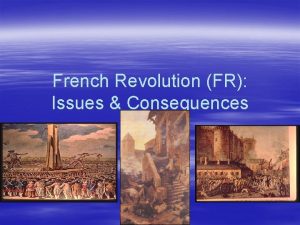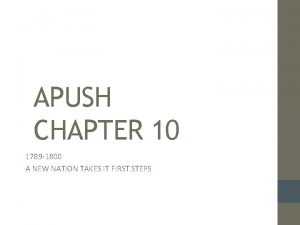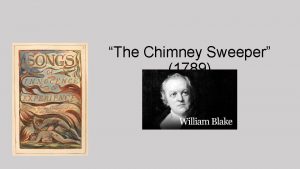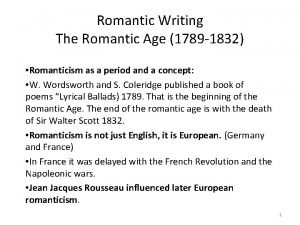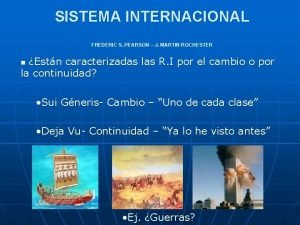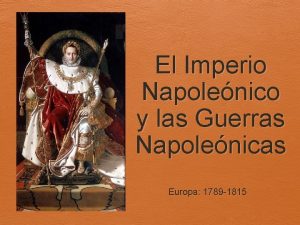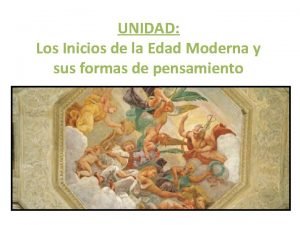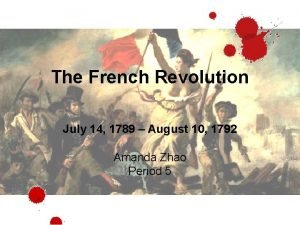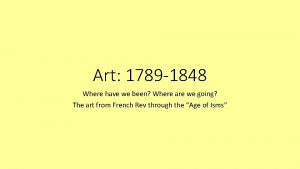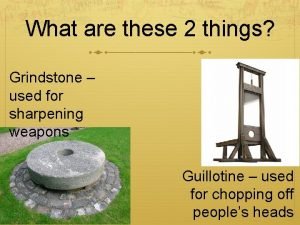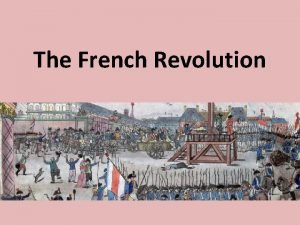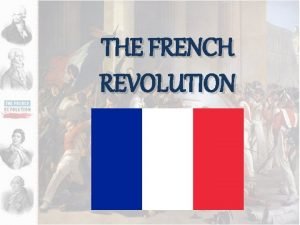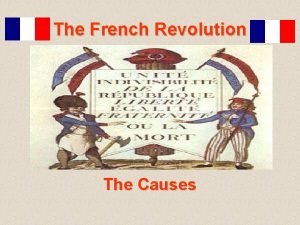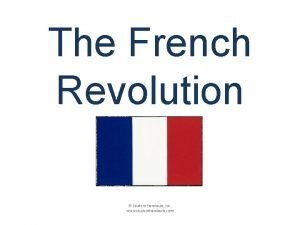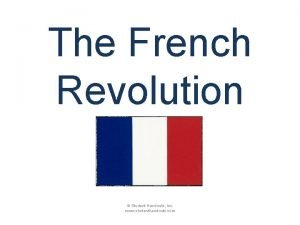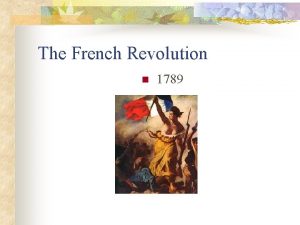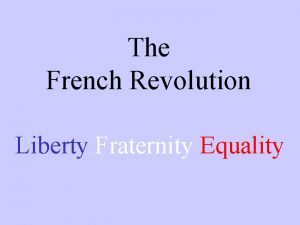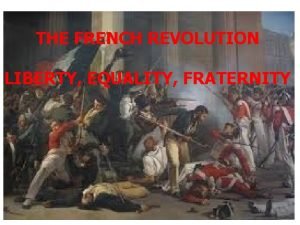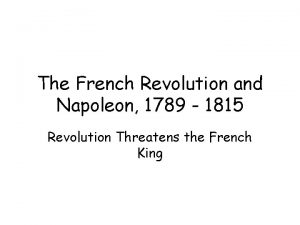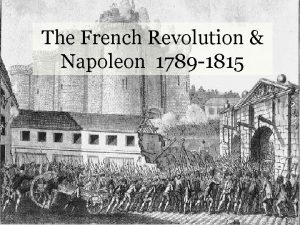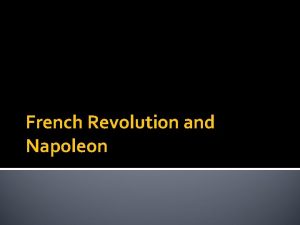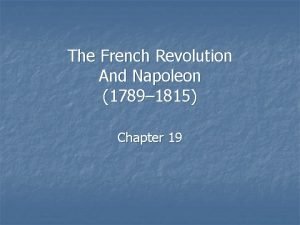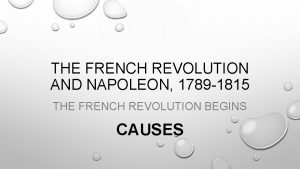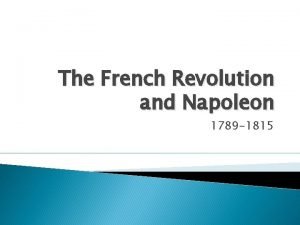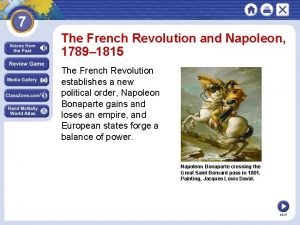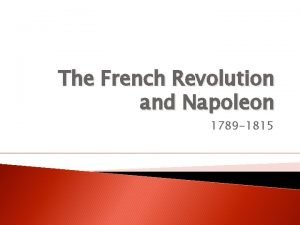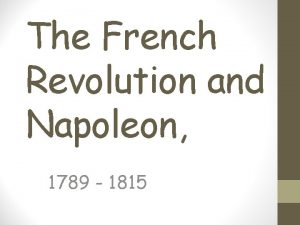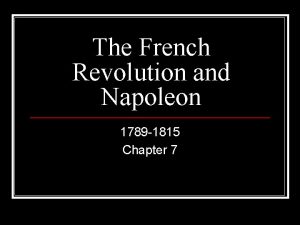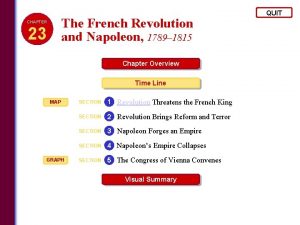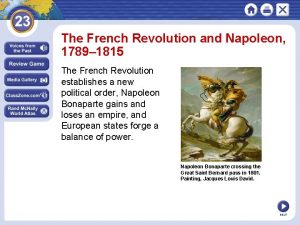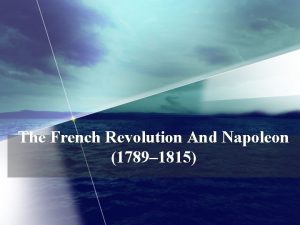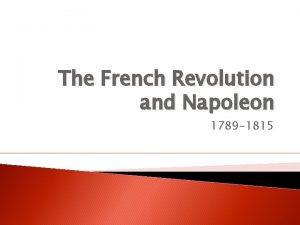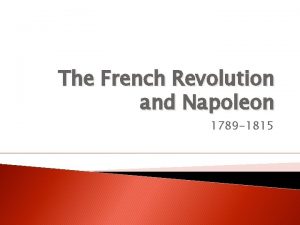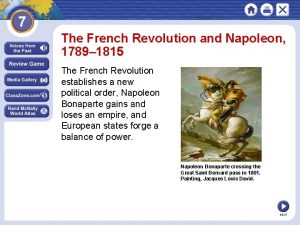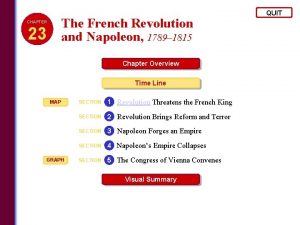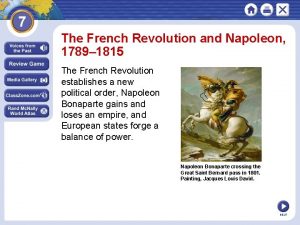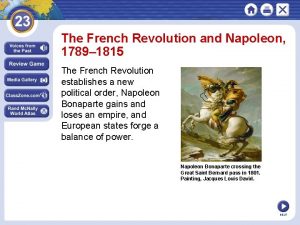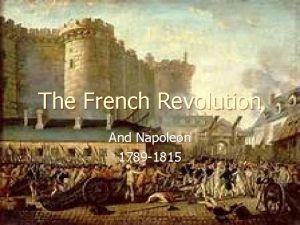French Revolution and Napoleon 1789 1815 1 On































































- Slides: 63

French Revolution and Napoleon 1789 - 1815

1 - On the Eve of Revolution Storming of the Bastille July 14, 1789

The Old Regime ¨ Period of time before 1789 ¨ Everyone in France belonged to a social class – First Estate – Second Estate – Third Estate

The Estates of France

Percentage of Land Owned

First Estate – The Clergy ¨ Wealthy and privileged ¨ Owned 10% of land ¨ Collected tithes ¨ Paid no taxes ¨ Provided social services ¨ Enlightenment showed abuses by clergy

Second Estate – The Nobility ¨ Top jobs in government, army, courts ¨ Little money income ¨ Paid no taxes ¨ Hated absolutism ¨ Feared losing privileges

Third Estate – 98% of Society ¨ 27 million people ¨ Three groups – Bourgeoisie (middle class) – Rural peasants – City workers

Discontent of the Third Estate ¨ Resented privileges of other estates ¨ Miserable wages ¨ Paid high taxes, fees and services ¨ Corvee – unpaid labor for roads and bridges ¨ Could not hunt ¨ Began to question

A Financial Crisis Deficit Spending

Deficit Spending ¨ When a government spends more than it takes in ¨ Owes interest ¨ Costly wars of Louis XIV ¨ Taxes increased to pay debts

A Crumbling Economy ¨ Bad harvests ¨ Cost of food soars ¨ Hard times and hunger anger people

Reform failed ¨ Louis XV ran up more debts ¨ Louis XVI was weak and indecisive ¨ Chose Jacques Necker to reduce spending and improve trade ¨ Necker wanted to tax second estate ¨ Estates General called

The King Takes Action France on the verge of bankruptcy

The Cahiers ¨ Notebooks containing grievances of each estate – Fairer taxes – Freedom of press – Right to kill animals ¨ Inflamed class hatreds

The Tennis Court Oath ¨ Third Estate delegates were elected ¨ 3 rd Estate influenced by Enlightenment ¨ Each Estate had one vote ¨ Formed National Assembly, invited other estates to join ¨ Took oath not to disband until new Constitution was written ¨ King gathered troops around Versailles

Storming the Bastille ¨ Mob attacked Bastille ¨ Political prisoners held there ¨ Mob broke through and liberated all 7 prisoners ¨ Symbol of the Revolution “Is it a revolt? No sire, it is a revolution!”

ESTATE DIVISIONS 1 ST ESTATE 2 ND ESTATE CLERGYConsisted mainly of bishops & abbots of the Roman Catholic Church. 3 RD ESTATE INTELLECTUAL NOBLES- BOURGEOISIE- Middle class Consisted of nobles that held Enlightenment bankers, factory high posts in the owners, merchants, professionals, & government & the skilled artisans. X military. X X X CITY ARTISANS- Tradespeople, apprentices, laborers, & domestic servants. PEASANTS- This group was poor & bound to the land like their medieval relatives had been.

ADVANTAGES/DISADVANTAGES FOR EACH ESTATE POLITICAL ECONOMIC SOCIAL Power in the Owned 10% of Provided hands of the King. the land, collected education & (Less tithes, & paid NO relief services to than 1% direct taxes to the poor. of the state! Hated the pop. ) Enlightenment ideas 1 ST Held the highest (2% of offices in the pop. ) government Owned 30% of the land & paid ALMOST NO taxes. 3 RD Had NO power to Paid ½ of their income in dues to (97% of influence the nobles, tithes to the pop. ) government. the Church, & taxes to the King’s agents. 2 ND Supported the Enlightenment ideas Embraced the Enlightenment ideas. Resented the 1 st & 2 nd Estate.


2 – Creating a New France The Revolution Begins

The Phases of the Revolution 1. National Assembly – France became a constitutional monarchy 2. Radical Phase – violence led to the Reign of Terror 3. The Directory – period of reaction against the violence 4. Age of Napoleon – put into practice many of the ideas of the Revolution

Revolts in Paris and Provinces ¨ Famine led to soaring prices ¨ Great Fear – rumors caused panic ¨ Peasants attacked nobles ¨ Radicals took over Paris – the Commune

Liberty, Equality, Fraternity ¨ Nobles in Assembly vote to give up privileges ¨ Gave up hunting rights ¨ Special legal status ¨ Exemption from taxes

Declaration of the Rights of Man ¨ Modeled after Declaration of Independence ¨ Locke – governments exist to protect rights of citizens ¨ All male citizens equal ¨ Freedom of religion ¨ Louis XVI slow to accept reforms

Women March on Versailles ¨ Women marched to palace – “Bread!” ¨ Anger directed at Marie Antoinette ¨ Forced king to return to Paris ¨ Royal family became prisoners

A Time of Reform ¨ Assembly took over and sold Church land ¨ Civil Constitution of the Clergy – clergy under state control ¨ Ended papal authority ¨ Many peasants did not support this change

Constitution of 1791 ¨ Made France a limited monarchy ¨ France divided into 83 departments ¨ Laws changed to be more fair ¨ Power still in hands of wealthy ¨ Moderates felt revolution was complete

Fateful Flight ¨ Royal family tried to escape ¨ Caught and returned to Paris ¨ Showed king was a traitor to the revolution

Reaction Outside France ¨ European nobility afraid of “the French plague” ¨ Emigres – nobles, clergy who fled France told horror stories ¨ Some predicted Revolution would be violent

War at Home and Abroad ¨ Economic problems fueled turmoil ¨ Sans-culottes – working class people ¨ They demanded a republic ¨ Jacobins and other radicals supported them

From Right to Left ¨ Seats at the Assembly ¨ Conservatives sat on the right side ¨ Moderates sat in center ¨ Radicals sat on left ¨ Today’s political spectrum

Political Spectrum

War Breaks Out ¨ Assembly declared war on Austria, Prussia, Britain ¨ Wanted to spread the revolution ¨ Great powers expected an easy victory over France

3 – Radical Days Violence Seizes France

Downfall of the Monarchy ¨ France losing battles ¨ King’s guards killed ¨ Royal family fled to Assembly ¨ Citizens killed imprisoned nobles

National Convention ¨ Radicals take over ¨ Voting extended to all male citizens ¨ Abolished monarchy ¨ Created a republic ¨ Nobility abolished ¨ All people now called “citizen”

Death of King and Queen ¨ Louis XVI convicted of treason and beheaded in Jan, 1793 ¨ Marie Antoinette beheaded in October

1793 - Convention Under Siege ¨ France at war with Britain, Spain, Netherlands, Prussia ¨ Committee of Public Safety – 12 men had absolute power to “save the revolution” ¨ French armies began to have success

Maximilien Robespierre ¨ Jacobin leader of Committee of Public Safety ¨ “Liberty cannot be secured unless criminals lose their heads. ”

The Reign of Terror ¨ July 1793 – July 1794 ¨ Perhaps 40, 000 died ¨ Led by Robespierre ¨ Guillotine used as instrument of death ¨ Robespierre eventually executed as people tired of bloodshed

The Directory (1795 – 1799) ¨ 3 rd constitution since 1789 ¨ 5 man Directory and two house legislature ¨ Corrupt government ¨ People looked to Napoleon

Women in the Revolution ¨ Many women took part in the Revolution ¨ Divorce made easier ¨ Women could inherit property ¨ Women eventually lost these rights

Changes in Daily Life ¨ Wearing of red “liberty caps” ¨ Showing the “tricolor” ¨ Children called “Constitution”, “Republic”

Nationalism ¨ Revolution and war brought people together ¨ An aggressive feeling of pride in and devotion to one’s country ¨ La Marseillaise – song that became national anthem of France

Social Reform ¨ Compulsory elementary education ¨ Secularized France ¨ Metric system established ¨ Nationalism in art

4. The age of Napoleon Begins

Napoleon Seizes Power ¨ Napoleon overthrows the weak 5 -Man Directory – Coup d’etat: sudden seizure of power. ¨ Napoleon sets up a three-man governing board, the Consulate – Becomes the 1 st Consul & assumes the power of a dictator.


Napoleon Rules France ¨ Sets up a tax collection & national banking system ¨ Dismissed corrupt officials & established government- run public schools. ¨ Concordat: Government recognized the influence of the Church but rejected Church control in national affairs. ¨ Plebiscite: Vote of the people to approve a new constitution… & Napoleon crowns himself as emperor.

Napoleonic Code ¨ Civil code enacted in 1804 - main influence on modern European legal systems ¨ Meant to rule with common sense and equality as opposed to tradition and the rule of monarchs ¨ All male citizens equal before the law – Wiped away privileges of class, nobility and wealth – Right of private property reintroduced ¨ Women lost property and trading rights ¨ Slavery returned

Napoleon Creates an Empire ¨ GOAL: To control all of Europe & reassert power in the Americas!!! ¨ Annexed Austria, Netherlands, parts of Italy, & set up a puppet government in Switzerland. ¨ Battle of Austerlitz: Napoleon defeated Austria, Prussia, & Russia & forced them to sign a peace treaty. ¨ Battle of Trafalgar: Britain defeats Napoleon & ensures the British supremacy & made Napoleon give up his plans of invading Britain.

Napoleon’s Costly Mistakes ¨ Continental System: Napoleon sets up a blockade to prevent all trade with Great Britain & other European nations. ¨ The blockade FAILED as smugglers managed to bring cargo from Britain to Europe. ¨ Britain responded with their own blockade & forced neutral ships to be searched & taxed by British.

¨ The Peninsular War: Napoleon wanted to force Portugal to accept the Continental System. – Sent troops through Spain…the Spanish king protested…Napoleon removed the king & put his brother, Joseph, on the throne. – The Spanish did not want Napoleon attacking & weakening the Catholic Church. • Guerillas: Spanish peasant fighters ambushed the French troops…killing 300, 000 men.

¨ Invasion of Russia: Napoleon resented Russia for pulling out of the Continental System so they attacked Russia. – French & Russian rulers suspected each other of having desire to claim Poland. – Alexander I retreated & burned the grain fields & livestock leaving the enemy nothing to eat! • When Napoleon reached Moscow the city was in flames… • Napoleon retreated back to France but he was met by exhaustion, hunger, & cold weather…leaving him with only 10, 000 soldiers.


Napoleon’s Downfall ¨ Britain, Russia, Prussia, Sweden, & Austria declared war on Napoleon. – Napoleon raised an army but they were untrained & not prepared. – Surrendered & gave up his throne. He was exiled to Elba (a tiny island off of the coast of Italy) – Louis XVI brother assumed the throne as Louis XVIII.

¨ The people of France did not support the king. – Napoleon heard of the news & escaped from Elba & became emperor!!! ¨ Battle of Waterloo: British & Prussian attacked & defeated the French troops. – Napoleon shipped to St. Helena (island in the South Atlantic) where he later died of stomach ailment (cancer)

St. Helena

Abdicate Annex Coup D'état Blockade Peninsulares Creoles Deficit Spending Balance of Power

The Congress of Vienna “The hands of the clock are turned back”

Vienna – 1814 -1815 ¨ Gathering of European leaders ¨ Goal to create lasting peace ¨ Balance of power ¨ Protecting monarchies ¨ Restore the “status quo” of 1792

The Settlement ¨ Surround France with strong nations ¨ Austria control over northern Italy ¨ Restored “legitimate” monarchies ¨ Concert of Europe established to keep balance of power Nationalism would shake the foundations of Europe!
 The tennis court oath
The tennis court oath What was an immediate cause of the 1789 french revolution
What was an immediate cause of the 1789 french revolution 5th may 1789
5th may 1789 Main causes of french revolution
Main causes of french revolution Chapter 11 the french revolution and napoleon
Chapter 11 the french revolution and napoleon Chapter 23 the french revolution and napoleon
Chapter 23 the french revolution and napoleon The french revolution and napoleon section 1 quiz
The french revolution and napoleon section 1 quiz Chapter 11 the french revolution and napoleon
Chapter 11 the french revolution and napoleon Napoleon 1789
Napoleon 1789 What were napoleon's goals
What were napoleon's goals Russian revolution vs french revolution
Russian revolution vs french revolution Economic causes of french revolution
Economic causes of french revolution Third estate political cartoon
Third estate political cartoon Napoleon dynamite french
Napoleon dynamite french Napoleon sells louisiana
Napoleon sells louisiana Liberalism and nationalism in germany 1815-71
Liberalism and nationalism in germany 1815-71 Causes and effects of the french revolution
Causes and effects of the french revolution The effects of the french revolution
The effects of the french revolution Causes and effects of french revolution
Causes and effects of french revolution French revolution causes and effects
French revolution causes and effects French revolution causes and effects
French revolution causes and effects Enlightenment ideals
Enlightenment ideals French revolution
French revolution Jack and jill french revolution
Jack and jill french revolution Ottoman empire in 1750
Ottoman empire in 1750 What is the route of the galleon trade from 1565 to 1815?
What is the route of the galleon trade from 1565 to 1815? Scopul sfintei aliante
Scopul sfintei aliante Congress of vienna vs treaty of versailles
Congress of vienna vs treaty of versailles Banginio ir liuto kova
Banginio ir liuto kova Frise chronologique 1815 à 1870
Frise chronologique 1815 à 1870 Frise chronologique 1815 à 1914
Frise chronologique 1815 à 1914 1814 took a little trip
1814 took a little trip 1815
1815 Augusta ada king, countess of lovelace
Augusta ada king, countess of lovelace Lovelace 1815
Lovelace 1815 Metternichovský absolutismus
Metternichovský absolutismus Green revolution vs third agricultural revolution
Green revolution vs third agricultural revolution Europe in 1789
Europe in 1789 1789 apush
1789 apush Symbol of the french revolution
Symbol of the french revolution Chimney sweeper songs of innocence
Chimney sweeper songs of innocence Bolton romanticism amp; politics 1789 1832 download
Bolton romanticism amp; politics 1789 1832 download Frise chronologique 1789 à 1799
Frise chronologique 1789 à 1799 Martin rochester
Martin rochester Europa en 1789
Europa en 1789 Cuadro comparativo entre antropocentrismo y teocentrismo
Cuadro comparativo entre antropocentrismo y teocentrismo The divisions in spanish colonial society 1789
The divisions in spanish colonial society 1789 1797 - 1789
1797 - 1789 July 14 1789
July 14 1789 1789 france
1789 france Against the gods 1789
Against the gods 1789 Art 1789
Art 1789 1789
1789 Grindstone french revolution
Grindstone french revolution France monarchy timeline
France monarchy timeline Sophie of france (1786-1787)
Sophie of france (1786-1787) Explain the causes of french revolution
Explain the causes of french revolution 4 stages of the french revolution
4 stages of the french revolution Short term causes of the french revolution
Short term causes of the french revolution Short term causes of the french revolution
Short term causes of the french revolution Political causes in french revolution
Political causes in french revolution French revolution timeline
French revolution timeline Fraternity in french revolution
Fraternity in french revolution What was the reason for the french revolution
What was the reason for the french revolution
